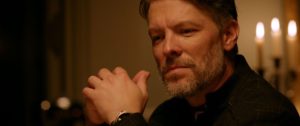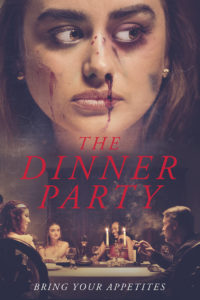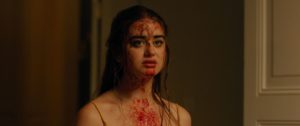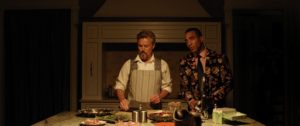Interview with “The Dinner Party” Director/Writer/Star Miles Doleac
Written by: Matt Patti | June 4th, 2020

I recently had the opportunity to speak with actor and director Miles Doleac (Demons), by phone, about his latest film, The Dinner Party (which I also reviewed), in which he is both director and co-writer, and stars as a supporting character, as well. In The Dinner Party, a couple, playwright Jeffrey and his wife Haley, are invited to a dinner hosted by artistic elites in hopes of getting funding for Jeffrey’s new play. However, the guests are all strange, not very welcoming, and seem to take more of an interest in Haley than Jeffrey. The night eventually descends into chaos, and the couple soon come to discover the elites’ true intentions. The creepy and disturbing horror/thriller honors some genre norms and challenges others while presenting strong women characters and themes of female empowerment. Below is an abbreviated transcript of our conversation, edited for length, and clarity.
Matthew Patti: What was the inspiration for this film and were there any other films that you were inspired by?

Miles Doleac: Well, that’s a good question. The bones of the screenplay came to me via one of our producers, Jim Bulian. The very original embryonic version of the screenplay was written by my co-writer Michael Donovan Horn. Jim had been an associate producer on our film Hallowed Ground, which is the film that we did before The Dinner Party, and was really keen to work with us again on something and so he brought us this script. I thought that original draft had a great deal of potential. It had a lot of elements that were attracting to me, including this fascinating, sort of psychoanalytical exploration of the idea that people who had suffered trauma or abuse, as a coping mechanism, went on to become abusive in their own right. And that even folks that we consider “bad” people have often been victimized in some way and I thought that was fascinating. I took the script on and did a good deal of work on it myself. I felt like it needed some narrative cohesion. I created the character of Sadie, which sort of tied it all together. But even before, in those initial stages, I thought it had a lot of potential and had elements of films that I admired, like The Cook, the Thief, His Wife, and Her Lover, or Mother! or Eyes Wide Shut, these types of films. I’ve always liked this sort of rogue gallery element, both in film and theater and these colorful, eccentric, complicated, troubled characters all coming together in one place and dealing with all their oddball quirks. Then, at the same time, the sort of artsy element of the whole thing, and I sort of approached the whole project like a kind of art museum piece, from a design perspective. So when we started talking about the look of the film, we talked about allowing Baroque paintings to inspire us like Caravaggio and Ribera and the opera stuff and the music angle and the ability to shepherd a film that has a great deal of entertainment value on the one hand but some social relevance on the other and that was female forward. That really appealed to me, all those things, on a number of levels. Then we brought together some really wonderful people and turned out something that I hope is pretty special.
MP: Speaking of being female forward, I picked up on that quite quickly, the film really does have a great message of women empowerment throughout, and I think many other horror/thrillers seem to be trending in the same direction with stronger female characters lately. How important is that in the industry today and are you happy with the recent trajectory?
MD: I think it’s supremely important. For the vast majority of the history of our industry, women have not received their due, not only in front of the camera, but behind it. I’ve seen these disturbing surveys of the fact that, even in films that have seemingly strong female characters, 70% of the time the men are talking. So, especially in my last couple of features, I’ve really tried to focus on putting women in the fore and telling stories that are female centric. I’m a teacher of film studies and filmmaking as well and we talk a lot in film theory about the male gait. So, I really wanted to sort of turn that around a little bit and explore things from a feminine perspective, at least to the best of my ability as a man, and to provide female characters’ voices and perspectives and agency and a lot of the things that I just think that, for far too long in our industry, female characters have not had enough of. So, I think it’s wonderful to see what the trajectory of the industry is right now. I think we’re absolutely moving in the right direction and it’s been a long time coming, so I’m really, really happy and humbled to, in some very small way, contribute to that movement in the right direction.
MP: In the film, Sadie seems to take a great liking to Haley. Why do you think this is? What makes Haley different than their previous dinner guests?
MD: I think Sadie sees in Haley, herself, and I think Sadie sees her own journey in Haley. Sadie sees where she was initially, in this place of vulnerability and innocence and being forced to behave and think and be a certain way that was sort of foisted on her that was not her choice. But, underneath all of that, she sees in Haley a certain power, formidability, sexuality, and intellect that is just bubbling up to the surface and trying to rise to the fore that has been sort of kept down by the forces around her, whether that has been her parents and her stepfather or, in the present scenario, Jeff. Sadie sees in Haley this force of nature, this beast, this power, that if unleashed could be this incredible force. So, I think that Sadie feels like Haley could be her match in some way, and that for Sadie is very attractive and I think probably something that she hasn’t seen in a very, very long time.
MP: When everyone is going around the table reading their fortune cards, their cards all seem to foreshadow what happens to them later in the film. Were the cards given out by the hosts in a deliberate manner to show this, or was there some power granting each dinner guest the fate of their card?
MD: I think that’s one of those things that I’d like the audience to decide themselves. I mean, certainly it’s possible that these cards are dealt randomly. It’s also possible that there’s some supernatural forces at play that are aiding and abetting the story that is about to occur. But you’re absolutely right. The cards do reveal something about what’s going on in the individual narrative of these characters, not only their past, but their future. A writer that I really, really admire is Quentin Tarantino and one of the things that Tarantino does so very well is that he puts these little speeches, moments, and experiences in the mouths of his characters that don’t feel like exposition yet. They reveal a great deal about who these characters are and contribute to the overall narrative and the story at the same time. So, we were attempting to sort of create that kind of vibe with this story, and that scene is certainly part and parcel of it. But, I think I would like to let the audience decide whether that is deliberate, the cards that each individual player is dealt or whether some supernatural force might be applied.

MP: As you alluded to earlier, many of the guests at the party experienced something traumatic in their past that leads to their current desires. Was there any inspiration or basis for the specific desires that some of these characters have, are those based off of anything, or just purely imagination?
MD: A lot of the specific traumas that the individual characters face, with the exception of Sadie, were in the lives and the individual stories of the characters when the script first came to me. That is Michael Donovan Horn’s, my co-writer’s, initial script. We talked about that and we wanted very much for these events and these experiences to have meaning and to have relevance in the narrative. That was really the most important thing for us, that somehow they folded in to who the characters were in this moment. I think that that’s really the primary significance in their histories, that they needed to contribute to the narrative and sort of build into the place where these characters were as we begin our narrative. Obviously, Michael and I both watched a lot of horror movies and there are tropes that have obviously influenced our way of thinking about how we write and conceive horror movies. You might think of something like The Silence of the Lambs or The Texas Chainsaw Massacre, whatever it might be, and that’s there for sure. But, at the end of the day, I think for both of us, what was most important was just that these experiences directly contributed to who these characters were and where they were in this moment and how they are moving through our narrative.
MP: Unlike in similar films, where the hosts might be overly friendly and a bit creepy to their guests, in this film the hosts and other guests are brash, a bit hostile, and not very welcoming – especially to Jeff. Was this done as a way to subvert typical genre norms?
MD: You always want to try to do something fresh. We always want to try to do something that doesn’t feel like it’s been done before. So, yeah, we were trying to subvert what is typical perhaps in that way. We also wanted to present a collection of characters who, at least the majority of them, could immediately see through Jeff’s artifice and to maybe get our audience thinking about what their real motivations were right off the top. Did they know who Haley was, for example, before they invited Jeff to this dinner party? So, we wanted to immediately get the audience thinking about what you said, so I’m glad to hear you say that. Why are they kind of being rude to him? Didn’t they invite him? Aren’t they talking about bankrolling his new play? This is really odd, right? Another film that directly or indirectly probably influenced what we’re doing at The Dinner Party is The Rocky Horror Picture Show, where this unexpecting couple shows up in this bizarre, macabre place, and everybody’s acting strangely and weird. And suddenly we find out that the folks who own the mansion have designs for the couple and they’re not entirely altruistic. So, we wanted to sort of create that feeling of it, like just that something is off and that these are not necessarily nice people, as with a lot of people that you need something from, and Jeff needs something from these people, he needs their money, he needs their backing. Often times you make deals with devils. These types of people are difficult to deal with, and it’s not always sunshine and rainbows. So we wanted to sort of put all that stuff out there and sort of let the audience decide what these folks are up to exactly, to create this feeling of foreboding right out of the gate.

MP: Agatha seems to intensely crave Haley sexually throughout the film. Even with all the opportunities Agatha has to have sex with her, she ultimately never does. Is this done out of respect, or is there perhaps another reason?
MD: I think it’s primarily done out of respect. I don’t want to spoil anything, but I think it’s primarily done out of respect and maybe out of fear of what the repercussions of that action might be, because she knows that she’s being watched. She knows she has a limited time with Haley and that there are other expectations for Haley from other members of the group. She’s only allowed this little window to do what she’s going to do, and she has to choose that time and whatever actions she takes wisely. So, yeah, I think it’s primarily out of respect to the other members of the group and to this idea that she only has a limited time with Haley to explore her desires, which are primarily, I think, in this very specific particular instance, about Jeff.
MP: The final question I have for you is related to the opening scene, where we see a bloody Sebastian choking up blood. I found that interesting that it was placed there. How did that decision come about?
MD: I think most really great movies have an attention grabber, something that draws you into the world and that raises the stakes and peaks your curiosity, and whether that’s the attack at the beginning of Jaws or kicking the police officers a** at the top of The Matrix, there is something that draws you in and it makes you go, “what exactly is going on here? How did we get here?” I really wanted that kind of moment at the top of this film. I wanted this kind of moment where the audience goes, “Oh, here’s a guy bleeding out from his jugular vein, how did that happen?” Then it sort of backtracks and gives the audience a breather and to let them sort of go on this journey. But, I just think hooking the audience out of the gate is so important and giving the audience that moment of, “Oh my God, what the hell is happening here?” Think about the opening bit of Pulp Fiction with Tim Roth and Amanda Plummer. You don’t really find out what that’s about until the very end of the movie, but you’re just sucked into that vortex, you’re sucked into that world. So I try in all my movies to begin with a question, to begin by asking something of the audience, and to begin with a request, which is, here’s this crazy, troubling, bizarre, complicated, whatever it might be, scenario, will you come along with me on this journey? And so, that’s what that opening was about.
MP: Thank you so much for your time, I really appreciate it.
MD: Absolutely. It’s my pleasure. I really appreciate you covering our film.
MP: Good luck with the film. I hope everything goes well with its release.
MD: Thank you. Thank you very much.



I personally absolutely adore this movie! Keep rewatching it (sort of paused around the Operas section to watch the operas myself and see how they befit the characters. For example – Carmine’s favorite, Bluebeard – he IS bluebeared; he lures in Judith (Haley) and her “betrothed” (Jeff) to (attempt) to enslave her. Vincent’s Wozzek is also reminescent of him as a character and and I wonder if Sadie is that woman he likes but ultimately betrays him through giving Haley strength. Just a conspiracy theory of mine. But i love the insane amount of layers i can go through in this movie.
Wow, I didn’t even catch those! Could be! But agreed, the filmmakers are extremely clever in their approach here and there’s so much to unpack in this film.